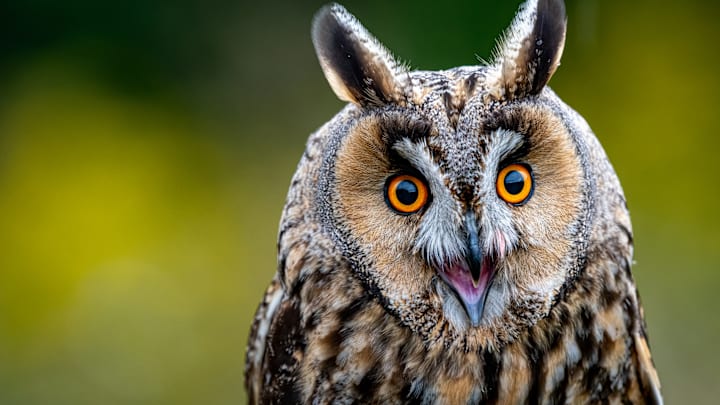For thousands of years, from Ancient Greek legend to modern literature and TV, humans have portrayed owls as sage and wise. The intelligent owl appears in everything from The Iliad to Winnie the Pooh. But, it turns out, though they’re excellent hunters, owls probably aren’t any smarter than a lot of other birds.
In fact, they may be significantly worse at problem solving than other big-brained birds like crows and parrots. One study from 2013 found that great gray owls repeatedly failed a simple cognitive test—pulling a string to get a treat—that had been successfully solved by several other bird species. It doesn’t help that owls face some steep competition in the avian class. Ravens are often ranked as one of the most intelligent non-human species along with dolphins and chimpanzees.
Owls may not be as smart as their corvid cousins, but that doesn’t make them dumb. Studies have found that some owls actually practice a primitive form of tool use. According to a study published in the scientific journal Nature, burrowing owls have been observed using animal dung to lure dung beetles to their burrows, where they subsequently feast on the insects.
However, while animal tool use is always impressive, it doesn’t really mean that owls are “wise” by any human standards. Owls are extraordinary animals in their own right. They’re incredible hunters who have evolved specialized hearing, camouflaging plumage, and unique tubular eyes that help them catch their prey.
Why Are Owls Considered Wise?
But, if owls aren’t mysterious guardians of life’s secrets, hiding deep reservoirs of wisdom behind their giant yellow eyes, then why do we so frequently represent them that way? Where does that idea come from?
While many cultures feature owls in their mythology, not all societies see owls as wise. In India, for instance, owls are associated with ill-gained wealth and foolishness rather than wisdom. The pervasive myth of the wise owl, meanwhile, likely originated with legends of the Ancient Greek goddess Athena. The goddess of wisdom, Athena was often portrayed in art holding an owl, or described in literary works as “owl-eyed” or even “owl-faced.”
Read More Stories About Birds Here:
Owls’ large eyes may have led to them being typecast as wise sages in literature. The bird’s striking peepers may not hold the answers to the mysteries of the universe, but they do serve a special purpose. The size enables a sort of night vision, allowing them to spot faraway prey in the dark. But the saucer-like eyes are not without their flaws. Up close, the world becomes blurry, so owls use the small, bristly feathers on their beaks and talons to feel their immediate surroundings.
Because their eyes are tubular instead of spherical—meaning they extend far back into their heads—owls can’t roll them around their sockets. Instead they have to move their entire heads to look around—which they can do 135 degrees in either direction. If you ever wondered how owls are able to pull an Exorcist without dying, you can read more about the impressive adaptation here.
A version of this story originally ran in 2015; it has been updated for 2024.
